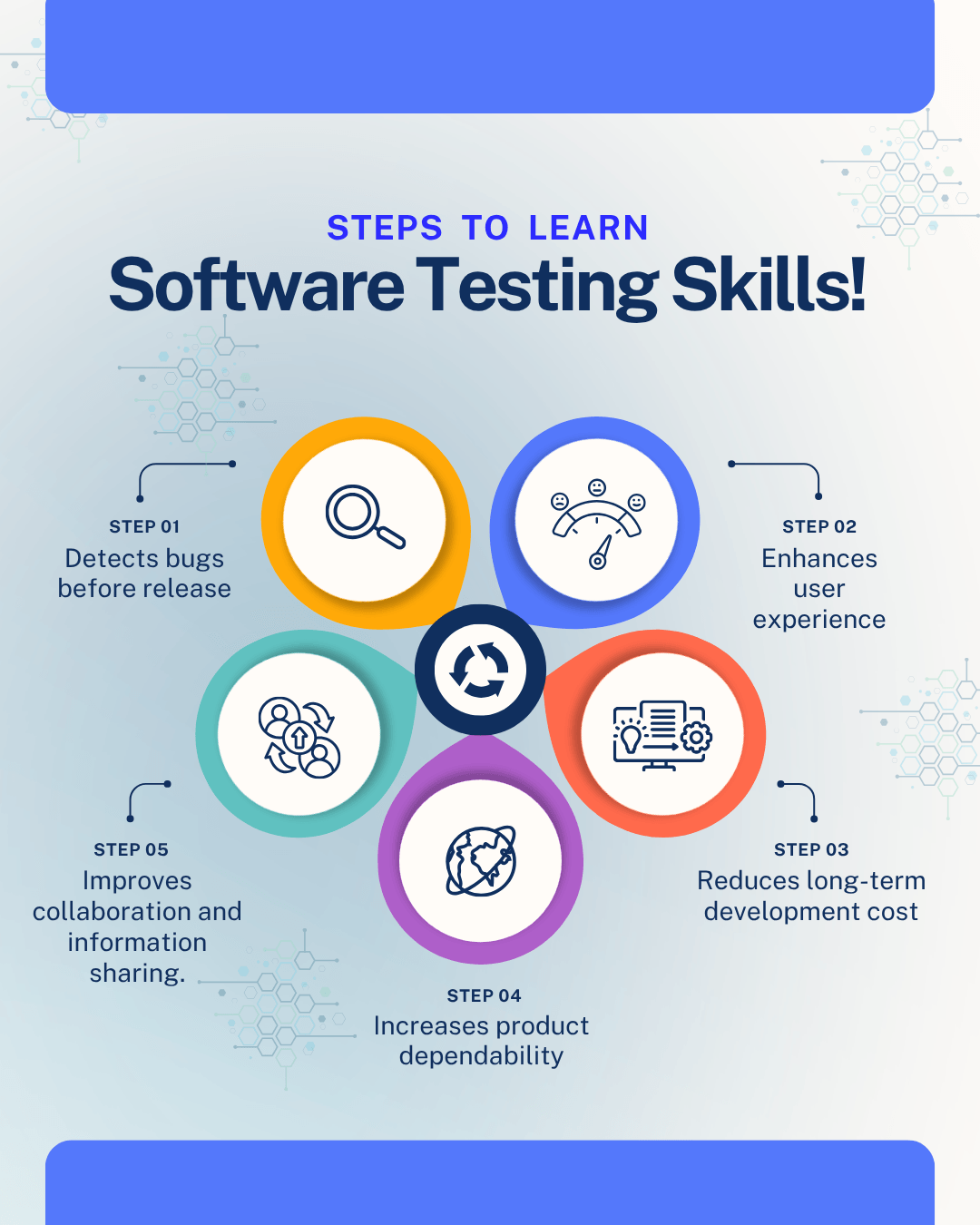Why Learning Software Testing in IT is the Best Career Move for IT Career?
The world of technology never slows down. With every new app, software update, or digital innovation, there’s one crucial question that stands tall—“Does it work flawlessly?” This is where software testers come into play. In today’s digital-driven ecosystem, software testing has evolved from being a support role to a strategic pillar within the IT industry.
So, whether you’re a fresh graduate, a developer exploring alternatives, or a non-IT individual aiming to break into tech—learning software testing can be your smartest career decision yet.
Let’s dive deep into why software testing isn’t just a career option, but a gateway to long-term IT success.

Table of Contents
1. High Demand Across Industries
Every business—from startups to global giants—relies on software. Be it banking, e-commerce, healthcare, or education, digital systems must run seamlessly. That’s why companies invest heavily in QA (Quality Assurance) teams.
According to NASSCOM and other IT industry reports, the demand for skilled testers has grown by over 30% in the past five years, especially with the rise of DevOps and Agile models.
If you’re skilled in testing methodologies, tools, and automation frameworks, you’re entering an industry that actively seeks your expertise.
2. Easy to Start – No Coding? No Problem!
One of the best things about learning software testing is the low entry barrier. While programming knowledge is a plus (especially for automation testing), it’s not mandatory for starting out in manual testing.
Testers need analytical thinking, communication skills, curiosity, and a deep focus on quality—all of which can be developed through hands-on training. So, if you’re wondering, “Can I enter IT without coding?” — testing might be your answer.
3. Evolving Career Paths and Roles
Gone are the days when software testing meant repetitive, checklist-based testing. Today, testers are:
Part of strategy and planning
Involved in early development stages
Working with CI/CD pipelines and automation tools
Contributing to business analysis and customer experience
This opens up paths like:
Manual QA Engineer
Automation Test Engineer
Performance Tester
Security Tester
Test Lead / Test Architect
QA Manager
DevOps QA Engineer
As you grow, your expertise doesn’t plateau—it multiplies across specializations.
Steps to Learn Software Testing
- Detects bugs before release
- Enhances user experience
- Reduces long-term development cost
- Increases product dependability
- Improves collaboration and information sharing

4. Boosted Salaries and Global Opportunities
Don’t underestimate the earning potential of a software testing career. Skilled testers, especially those with automation knowledge, are paid on par with developers.
In India, the average salary for a software tester starts from ₹3.5–5 LPA for freshers and can go beyond ₹12–15 LPA for professionals with 5+ years of experience, especially in automation and performance testing roles.
What’s more? Global demand in countries like the USA, UK, Canada, Germany, and Australia means onsite opportunities and international projects are also on the table.
5. Core Role in Quality and Product Success
Testers are not just “checkers”. They’re the last line of defense before the product hits the real world. A faulty app release can cost millions and ruin a brand’s credibility. That’s why testers are trusted with making critical quality decisions.
If you’re someone who enjoys:
Finding bugs
Preventing errors
Improving user experience
Understanding systems deeply
…then you’re already thinking like a great tester.
6. Exposure to Automation and New Tech
Modern software testing isn’t limited to clicking through screens.
You get to work with:
Automation tools like Selenium, Playwright, Cypress
Performance testing tools like JMeter and LoadRunner
CI/CD systems like Jenkins, GitLab, Azure DevOps
Scripting languages like Python, Java, and JavaScript
AI and ML-based testing tools are also emerging!
This blend of technical exposure makes your profile future-ready, even allowing a smooth transition into DevOps or development roles if desired.

Become a software testing pro
Learn industry-driven testing strategies to deliver flawless,
high-quality applications
7. It’s a Logical, Stable, and Satisfying Career
Many professionals love software testing for its systematic approach—you work with logic, break down features, explore edge cases, and contribute directly to quality.
There’s also long-term stability:
With digital transformation becoming a priority, testing is one of those evergreen career paths that isn’t going away anytime soon.
8. Soft Skills that Translate Across Careers
Testers develop amazing soft skills:
Communication (documenting and reporting bugs)
Attention to detail
Critical thinking
Collaboration with developers, BAs, and product teams
These skills enhance your career mobility, making it easier to shift into roles like Business Analyst, Product Manager, or even Project Manager later.
9. Opportunities for Freelancing and Remote Work
With tools like BrowserStack, Postman, and Jira, testing has become highly remote-friendly. Many freelance platforms like Upwork, Freelancer, and Toptal offer QA testing gigs that pay in USD.
So if flexibility is what you’re looking for—software testing gives you room to grow both in-office and remotely.
10. The Right Training Makes All the Difference
While self-learning is possible, structured guidance makes your journey smoother.
For learners in Tamil Nadu, finding the best software training institute in Chennai can truly be a game changer. With expert trainers, real-time projects, interview prep, and personalized mentorship, you can fast-track your testing career and get placed in top MNCs.
Whether you’re a fresher or a professional looking to reskill, a reliable training environment can build both your confidence and competence.
FAQs – Software Testing Career
Yes, it’s beginner-friendly and offers multiple growth paths.
Not for manual testing, but automation requires basic scripting skills.
Freshers can earn ₹3.5–5 LPA, and experienced testers earn ₹10+ LPA.
With focused training, you can learn the basics in 2–3 months.
Absolutely! It’s a critical role across every tech product and industry.
Yes, testing is accessible with the right mindset and training.
Both are important. Start with manual and grow into automation.
It involves deadlines, but it’s structured and logical—not chaotic.
Yes, freelance and remote QA roles are common on global platforms.
Search for the best software training institute in Chennai that offers hands-on testing modules, placement support, and real-time projects.
Conclusion
So instead of waiting for the “perfect” moment, take the first step. Learn, test, grow—and launch a rewarding career in tech.